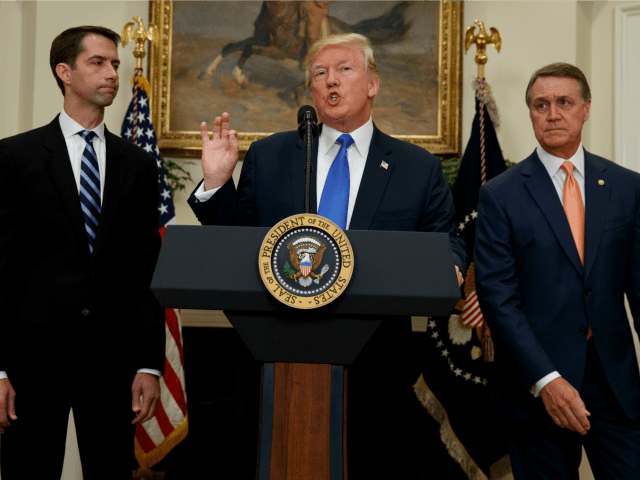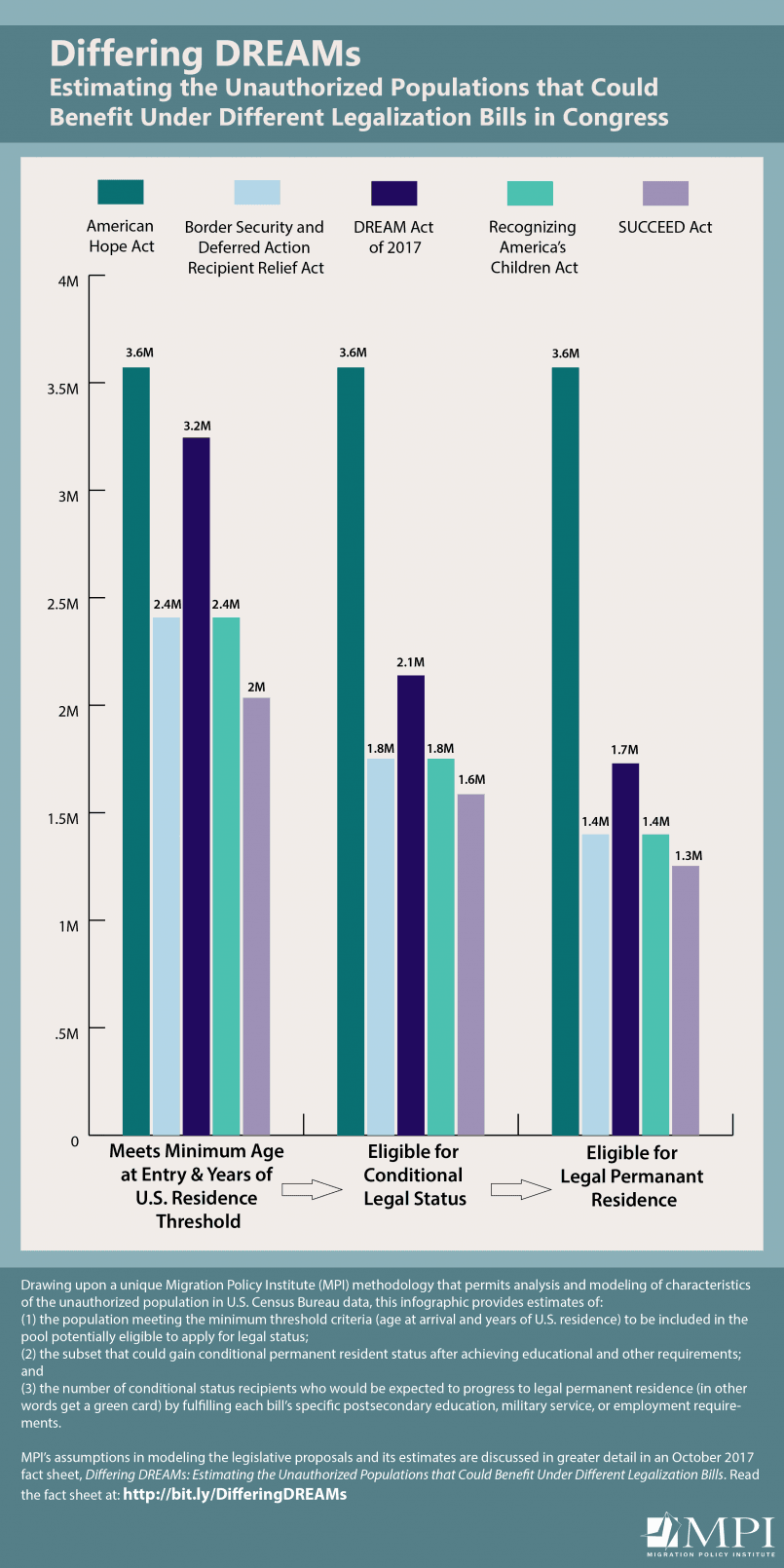John Kelly Meets With Pro-Amnesty Senators
White House Chief of Staff John Kelly met Tuesday with a group of two Democratic and five GOP Senators who are pushing for a large, unpopular and pro-business amnesty in early January, according to news reports.
Politico.com reported the meeting, which also included two pro-American GOP Senators:
At a Tuesday afternoon meeting with nearly a dozen senators deeply involved in immigration policy, White House chief of staff John Kelly pledged that the administration will soon present a list of border security and other policy changes it wants as part of a broader deal on so-called Dreamers, according to people who attended the meeting. The plan could come in a matter of days, senators said …
“We couldn’t finish this product, this bill, until we knew where the administration was,” Sen. Jeff Flake (R-Ariz.), who has been negotiating a DACA compromise for weeks, said in an interview after the meeting with Kelly. “And that’s why this meeting was so important.”
The Politico article was not able to say that Kelly made any offer to the pro-amnesty Senators — despite the author’s pro-immigration stance.
President Donald Trump laid down his popular immigration promises during the 2016 election and issued another set of principles in October. Those promises include no amnesty for years, while the October principles demanded that any congressional deal stop the hugely expensive practice of chain-migration and also end visa lottery. Trump’s officials and deputies — including Kelly — are also emphasizing those goals in their public and private statements.
If chain-migration is ended, immigration would fall by roughly 50 percent. That change would help push up wages for Americans and help get nine million sidelined Americans into jobs. The change would also slow the nation’s politically chaotic slide into diversity and cultural conflict, and force Democrats to shift their electoral emphasis from immigrants’ concerns back towards Americans’ priorities.
But Trump has also said he wants to get an amnesty for at least some of the younger illegals, despite his campaign-trail opposition to a wage-lowering amnesty.
Democrats hope to persuade Trump to back an amnesty and so betray his supporters before the 2018 elections.
The Democratic Senators at the meeting included the Democrats’ chief amnesty advocate, Sen. Dick Durbin, and also Colorado Sen. Michael Bennet.
Five pro-amnesty GOP Senators who are working with Durbin and Bennet also attended. They are Arizona Sen. Jeff Flake, Oklahoma Sen. James Lankford, North Carolina’s Sen. Thom Tillis, South Carolina’s Sen. Lindsey Graham and Colorado Sen. Cory Gardner.
The meeting reunited four members of the 2013 “Gang of Eight” amnesty bill — Durbin, Bennett, Graham, and Flake. The amnesty plan proved disastrous for Democrats because it helped the GOP gain nine seats in 2014, and put Donald Trump on a path to the presidency.
The Kelly meeting also included Texas Sen. John Cornyn, who has also worked with Sen. Chuck Grassley’s SECURE Act, which would close the visa lottery program and the chain migration. The reports do not say that Grassley attended the meeting.
Grassley’s SECURE Act includes also includes a small-scale amnesty, dubbed the BRIDGE Act, which would provide a one-time set of three-year work-permits to roughly 690,000 illegals. However, outside experts assume that Grassley’s inclusion of the BRIDGE Act in his SECURE Act is just a place-holder for a larger amnesty.
One likely alternative is the SUCCEED amnesty being pushed by two GOP Senators, outsourcing advocate Tillis and pro-illegal immigrant Lankford.
The Tillis and Lankford SUCCEED Act amnesty would help employers and retailers by providing work-permits and welfare benefits to 2 million illegals, while also helping the GOP with a 1o-year delay on chain migration and a 15-year delay on voting. The Tillis/Lankford Act, however, does not reduce the economic impact on ordinary Americans who would have to compete for jobs against the low-wage amnesty beneficiaries and also pay for their welfare.
Nine million working-age men have been pushed out of the labor market as wages fell — and corporate profits rose — amid mass-immigration.
Yet Lankford has spoken up in favor of illegal immigrants’ competition for jobs. “That continual competition … continues to help us,” he said, referring to business, not to voters.
In a talk with reporters at the end of the meeting, Cornyn did not comment on the President’s goal of ending chain migration and the visa lottery, according to the Politico account. Instead, he played up token improvements on border security to slow the inflow of illegal immigrants, which may have reached 400,000 in 2016. That is equal to only one-third of the 1.2 million legal immigrants who were given green cards by the federal government in 2016.
According to Politico:
“I think what we’re trying to do is to get some clarity from the administration on what they require by way of border security and other enforcement measures,” Cornyn said as he left the meeting. “We got a promise to provide it to us and hopefully we’ll get that in short order. Maybe even this week.”
A report by the TheHill.com also quoted Cornyn on border security, not on the more important issue of the annual inflow of chain-migrants:
“We’re having meetings, ongoing meetings … Several of us are going to be meeting with General Kelly and Customs and Border Protection tonight to talk about what the president will be looking for when he signs a bill,” he said.
The focus on token border-security measures was noted by Mark Krikorian, director of the Center for Immigration Studies.
No mention of chain migration changes here. There is no package of border measures (or even interior enforcement) that would be sufficient offset for a DACA amnesty (let alone the much, much larger Dream Act). https://t.co/bOFSLZn1Lg
— Mark Krikorian (@MarkSKrikorian) December 20, 2017
The meeting with Durbin and Kelly was also attended by the two most pro-American Senators, Arkansas’ s Tom Cotton and Georgia’s Sen David Perdue.
Their RAISE Act is backed by Trump and would end chain-migration and the visa-lottery, and help raise Americans’ salaries and productivity.

President Donald Trump, flanked by Sen. Tom Cotton, R- Ark., left, and Sen. David Perdue, R-Ga., speaks in the Roosevelt Room of the White House in Washington, Wednesday, Aug. 2, 2017, during the unveiling of legislation that would place new limits on legal immigration.
In recent weeks, Trump and GOP leaders have faced down a Democratic threat to shut down the federal government unless the GOP agrees to the DREAM Act amnesty, which would put 3.25 million people on track for green cards and citizenship.
The Democrats’ act would cost at least $27 billion in taxpayer funds by 2027 — and would allow the new migrants to get green cards for millions of their chain-migration relatives, including the illegal-immigrant parents who brought the so-called ‘dreamers’ into the United States.
Senate Majority leader has rejected the Democrats’ DREAM Act, and has backed the Grassley SECURE Act. But he has hedged his bets on what kind of deal he wants and when.
McConnell plays a vital role because he decides what bills can be placed on the Senate calendar. He has already put Grassley’s SECURE Act on the calendar and could bring it up for a vote, which would put Democrats in the difficult choice of rejecting the SECURE Act — despite its limited amnesty — to preserve the inflow of Democratic-leaning, wage-cutting voters via chain-migration.
But McConnell has kept his cards close to his chest. “We will not be doing DACA this week,” McConnell told Fox News Tuesday evening. he continued:
That is a matter to be discussed next year. The President has given us until March to address that issue. We have plenty of time to do that.
McConnell did not say if he planned to support President Trump’s priorities, or instead if he will back business donors’ demands for more imported workers and consumers.
Many polls show that the Democrats’ calls for amnesty are unpopular because they contradict Americans’ sense of fairness to other Americans. That pro-American pressure is hidden by business and largely ignored by the media — despite the 2016 election results — but could play a large role in the pending 2018 election fights.
Business groups and Democrats embrace the misleading, industry-funded “nation of immigrants” polls which pressure Americans to say they welcome migrants.
The alternative “fairness” polls show that voters put a much higher priority on helping their families, neighbors, and fellow nationals get decent jobs in a high-tech, high-immigration, low-wage economy.
The political power of the voters’ fairness priorities was made clear during the GOP primaries and again in November 2016. This year, groups such as FAIR and Americans for Legal Immigration PAC have deterred many business-first GOP politicians from openly supporting an amnesty.
Multiple polls show the public is strongly opposed to the Democrats’ threat to shut down the government if they do not get their DREAM Act amnesty by Christmas for 3 million illegals.
Each year, 4 million Americans turn 18 and begin looking for good jobs in the free market.
But the federal government inflates the supply of new labor by annually accepting 1 million new legal immigrants, by providing work-permits to roughly 3 million resident foreigners, and by doing little to block the employment of roughly 8 million illegal immigrants.
The Washington-imposed economic policy of mass-immigration floods the market with foreign labor, spikes profits and Wall Street values by cutting salaries for manual and skilled labor offered by blue-collar and white-collar employees. It also drives up real estate prices, widens wealth-gaps, reduces high-tech investment, increases state and local tax burdens, hurts kids’ schools and college education, pushes Americans away from high-tech careers, and sidelines at least 9 million marginalized Americans and their families, including many who are now struggling with opioid addictions.
The cheap-labor policy has also reduced investment and job creation in many interior states because the coastal cities have a surplus of imported labor. For example, almost 27 percent of zip codes in Missouri had fewer jobs or businesses in 2015 than in 2000, according to a new report by the Economic Innovation Group. In Kansas, almost 29 percent of zip codes had fewer jobs and businesses in 2015 compared to 2000, which was a two-decade period of massive cheap-labor immigration.
Because of the successful cheap-labor strategy, wages for men have remained flat since 1973, and a large percentage of the nation’s annual income has shifted to investors and away from employees.






Comments are closed.